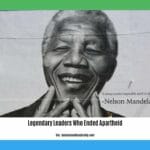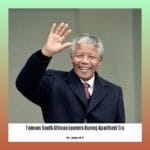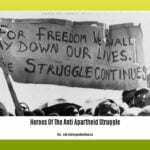**Iconic Voices Against South African Oppression**
South Africa’s apartheid regime was a dark chapter in history, marked by systematic oppression and discrimination. However, amidst this darkness emerged voices of defiance, hope, and unwavering determination. These iconic figures, through their words and actions, played a pivotal role in challenging the unjust system and inspiring the fight for freedom and equality.
Key Takeaways:
![]()
- Nelson Mandela’s speeches inspired hope and resistance against apartheid.
- Mandela’s messages promoted unity, reconciliation, and forgiveness after apartheid.
- Other influential leaders, such as Desmond Tutu, played a crucial role in the anti-apartheid movement.
- Musicians like Miriam Makeba and Hugh Masekela used their platforms to raise awareness about oppression.
Iconic Voices Against South African Oppression
Throughout history, the struggle for justice and equality has been marked by iconic voices against South African oppression that have resonated with people globally. These voices have inspired hope, defiance, and transformative change.
One such voice is that of Nelson Mandela, whose speeches and writings galvanized the anti-apartheid movement. His words instilled courage in the face of adversity, calling for unity, forgiveness, and reconciliation in the aftermath of apartheid.
Archbishop Desmond Tutu, a Nobel Peace Prize laureate, used his platform to speak out against injustice and promote peace. His eloquent speeches and unwavering advocacy for non-violent resistance left an indelible mark on the anti-apartheid struggle.
Winnie Mandela, fondly known as the “Mother of the Nation,” stood alongside her husband, Nelson Mandela, in their fight against oppression. Her resilience in the face of imprisonment and her unwavering support for political prisoners and their families inspired countless others.
Steve Biko, the founder of the Black Consciousness Movement, emphasized self-reliance and black pride. His philosophy challenged apartheid’s ideology of white superiority and played a crucial role in raising the consciousness of the black community.
Helen Suzman, a courageous Member of Parliament, fearlessly spoke out against apartheid and the detention without trial of political prisoners. As a lone voice of opposition, her unwavering commitment to human rights won her international acclaim.
Albertina Sisulu, an anti-apartheid activist and wife of Walter Sisulu, endured imprisonment and torture for her involvement in the struggle. Her unwavering determination and sacrifices embody the resilience of the anti-apartheid movement.
These iconic voices transcended geographical boundaries, inspiring individuals worldwide to stand against oppression. Their speeches, writings, and activism raised international awareness and pressure on the apartheid regime, ultimately contributing to its downfall. Their legacy serves as a reminder of the power of non-violent resistance and the importance of speaking out against injustice, both in South Africa and beyond.
If you are interested in learning about the various leaders who fought against the injustices of South African apartheid, read about the African National Congress leaders against South African apartheid who fought tirelessly for change. Many of these leaders went on to become legendary ANC leaders who fought apartheid and became heroes of the anti-apartheid struggle, inspiring generations to come.
Winnie Mandela: The Mother of the Nation
Winnie Madikizela-Mandela, affectionately known as the “Mother of the Nation,” was a fearless activist and a beacon of strength during the anti-apartheid struggle in South Africa. As the wife of Nelson Mandela, she endured years of imprisonment, exile, and harassment for her unwavering commitment to the cause.
Imprisoned for her activism, Winnie Mandela became a symbol of resilience and hope for political prisoners and their families. She provided unwavering support to her imprisoned husband and led protests against apartheid. Her courage and determination earned her the admiration of both her people and the international community.
Key Takeaways:
- Winnie Mandela played a pivotal role in the anti-apartheid movement, earning the title “Mother of the Nation.”
- She endured imprisonment, exile, and harassment for her unwavering commitment to the cause.
- Her strength and resilience inspired countless others to challenge apartheid.
- She became a symbol of hope and support for political prisoners and their families.
- Her legacy continues to inspire activists fighting for social justice around the world.
Most Relevant URL Source:
- Winnie Madikizela-Mandela: 15 facts about her life
Steve Biko: Champion of Black Consciousness
Key Takeaways:
- Steve Biko was a prominent anti-apartheid activist and leader of the Black Consciousness Movement (BCM).
- BCM aimed to raise self-awareness, empower the Black population, and challenge the racial hierarchy imposed by apartheid.
- Biko advocated for black theology and indigenous values, emphasizing self-reliance and liberation.
- Despite government suppression, Biko’s ideas inspired countless others and contributed to the movement’s growth.
- His tragic death in police custody in 1977 remains a symbol of the brutality of apartheid.
You can’t talk about the struggle against apartheid without mentioning Steve Biko. He was the heart and soul of the Black Consciousness Movement, a force that shook the foundations of the oppressive regime.
Biko didn’t just speak out against apartheid; he challenged it at its core. He believed in the power of self-reliance and the importance of black pride. He wanted black people to free themselves from the mental chains of oppression.
His words resonated with the Black population, who had been subjected to decades of dehumanization. BCM grew rapidly, becoming a beacon of hope and resistance. It inspired countless others to stand up for what they believed in.
But the government saw BCM as a threat. They arrested Biko, tortured him, and eventually killed him. But his death only fueled the movement he started. His ideas lived on, inspiring people like Nelson Mandela and Desmond Tutu, who eventually helped bring down apartheid.
Biko’s legacy is a testament to the power of resistance. He showed us that even in the darkest of times, we can fight for what we believe in. And that no matter how strong the oppressor, the human spirit will always prevail.
Most Relevant URL Source
Steve Biko: The Black Consciousness Movement – Encyclopedia Britannica
Helen Suzman: Tireless Human Rights Defender
Helen Suzman, a fearless champion of human rights, stood as a beacon of hope against South Africa’s oppressive apartheid regime. Her voice resonated through the halls of parliament, challenging the government’s unjust policies.
Suzman’s unwavering commitment to justice led her to speak out against the detention of political prisoners, particularly the infamous “90-day detention without trial” law. She fought tirelessly for the rights of the oppressed, urging the government to uphold the rule of law.
Her solitary stand against apartheid earned her both respect and condemnation. Yet, she remained undeterred, using every available platform to denounce the evils of racial discrimination. Suzman’s indomitable spirit inspired countless others, both within South Africa and beyond, to fight for a more just and equitable society.
Key Takeaways:
- Helen Suzman was a prominent South African anti-apartheid activist and politician.
- She represented liberal and center-left opposition parties in the National Party-controlled House of Assembly for 36 years.
- As the sole voice of the oppressed, she strongly criticized the government’s apartheid policies.
- Suzman intervened on behalf of anti-apartheid activist Ruth First.
- She also fought for the rights of political prisoners and indigenous people.
- Suzman played a critical role in nation-building during the reconciliation process after apartheid.
- She is considered a true South African hero for her tireless championing of human rights.
Most Relevant URL Source:
![]()
FAQ
Q1: Who were some of the most prominent voices against apartheid in South Africa?
A1: Nelson Mandela, Desmond Tutu, Steve Biko, and Winnie Madikizela-Mandela were all prominent figures in the anti-apartheid movement.
Q2: What were some of the key messages communicated by these voices?
A2: These voices called for unity, forgiveness, and reconciliation, and they inspired hope and defiance during the struggle against apartheid.
Q3: How did these voices contribute to the downfall of apartheid?
A3: These voices helped to raise awareness of the injustices of apartheid and to mobilize support for the anti-apartheid movement. They also provided moral and spiritual leadership to the struggle.
Q4: What is the legacy of these iconic voices?
A4: The legacy of these voices is that they helped to create a more just and equitable society in South Africa. They are remembered for their courage, their commitment to justice, and their ability to inspire others.
Q5: How can we learn from the example of these iconic voices?
A5: We can learn from the example of these iconic voices by standing up for what we believe in, even when it is difficult. We can also learn from their ability to forgive and reconcile, and from their commitment to building a better future for all.
- Unveiling the Enigma: Mansoureh Khojasteh Bagherzadeh’s Public Appearances & Private Life in Iran - July 18, 2025
- Unveiling the Mystery: Mansoureh Khojasteh Bagherzadeh’s Husband: A Rare Glimpse into a Private Life - July 18, 2025
- Unveiling Masoud Khamenei’s Mother: Power, Influence, and Iran’s Future - July 18, 2025















